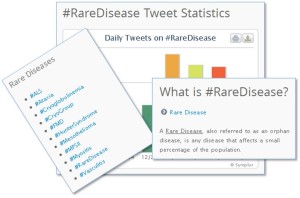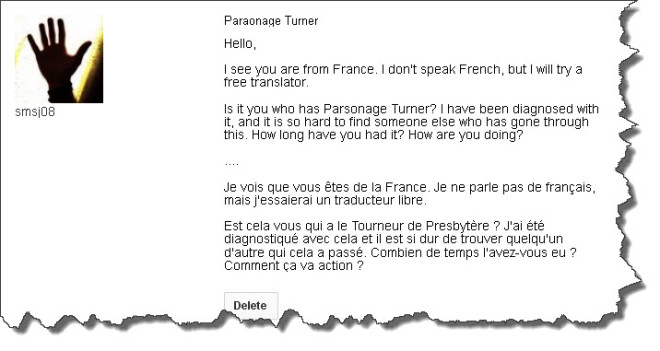When it comes to The Healthcare Hashtag Project, one of the most rewarding things for us at Symplur is to see people use and share the tools and information that they find during their visit. To know that the project is found to be useful by a diverse community of healthcare workers, caregivers, and patients makes us feel like we’re helping to fill a void. And perhaps nowhere is that void more evident than for those whose lives are touched by a rare disease.
I say that about rare disease with some rather firm confidence … because I speak from personal experience. Please allow me to explain …
Contracting a rare disease can be unexpected
About four years ago, just a couple of days after Christmas, I came down with flu-like symptoms. I seldom sleep more than four to six hours a night, but given my condition I slept, almost motionless, for fourteen hours straight. When I finally awoke I noticed that my left shoulder was aching. I figured that all I needed to do was get up, move around, shake it out a little bit, and I’d be fine.
Not so.
Through all of this I kept searching the web for my symptoms, but there were no answers, no similar experiences to be found.
Over the coming hours the aching became worse. And over the next few days the aching gave way to a much more significant pain, at times feeling like my shoulder and upper back were being shredded with hot forceps. With my regular doctor away for the holidays, I went to an urgent care where I was diagnosed with a strained trapezoid (muscle) and given a prescription for Tramadol, a narcotic-like pain reliever.
The Tramadol wasn’t working, and I didn’t believe the diagnosis.
Three weeks into this I thought I was going to lose my mind. At times I just about collapsed to the floor, unable to fend off the pain for another moment. Through all of this I kept searching the web for my symptoms, but there were no answers, no similar experiences to be found.
Little did I know that the real scary thing was about to come.
Rare diseases and disorders can take surprising turns … for both better and worse
Approaching four weeks into this malady, my physician was now back in town and I had an appointment scheduled with him that was only a day away. Having just struggled through another painful and nearly sleepless night, I decided it was time to get up. Only this time it was different.
Relief quickly shifted to worry. Did I have some sort of stroke?
Early on I discovered that the pain seemed more significant when I was lying down. So I had gotten in the habit of sleeping while sitting upright in a chair, and kept a blanket covering me as best as I could. On this morning I reached for the blanket to toss it off my legs, but quickly became confused. My brain was telling my arm to lift the blanket, but my arm wasn’t getting the signal. As my grogginess lifted, I tried again with a little more focus. But once again I didn’t have the strength to lift that blanket. I was a bit stunned, and still confused. But just as I was realizing that I had no strength in my left shoulder, I also realized something else … I was completely pain free for the first time in nearly a month. There was no gradual reduction to the pain. It had just vanished!
Not sure what to think, but happy that the pain was gone, I began my morning ritual with a shave. When done, I found that I didn’t have the strength in my left arm to even lift the can of shaving cream high enough to place it on the shelf in the medicine cabinet in front of me.
Relief quickly shifted to worry. Did I have some sort of stroke?
With rare disease … answers are often incomplete
Once at my physician’s office I explained the strange chain of events. He quickly suggested that my story sounded neurological, and he wanted to consult with a neurologist who he knew and trusted. As a matter of fact, he proceeded to do so via phone right in front of me. It sounded like a Bob Newhart comedy routine where you only hear one side of the phone call and just imagine what the other party is saying.
All I heard my doc saying was, “No! That’s awful! Are you serious? That’s just terrible!”. Needless to say, I wasn’t encouraged. :-/
No health professional that I was encountering had any experience with my rare condition.
Then came the suspected diagnosis, “Parsonage Turner Syndrome”, a rare set of symptoms resulting from inflammation of the brachial plexus, a network of nerves supplying the arm and parts of the shoulder. The inflammation is of unknown etiology and is characterized by sudden onset of severe pain lasting from a few days to a few weeks, followed by a sudden disappearance of that pain. When the pain subsides the patient is left with a marked weakness in the affected area and significant muscle atrophy. About one in one-hundred-thousand people are afflicted with this rare disease. And though it has nearly a 100% recovery rate from the devastating muscle weakness that occurs, that recovery usually comes slowly, over two to five years.
My diagnosis was confirmed following an MRI to rule out anything else, and a visit to the neurologist. However, even he, who had been in practice for 26 years, admitted that I was only his second case. And when I showed up for my first day of physical therapy I couldn’t help but wonder what I was facing. How long was my own recovery going to be? No health professional that I was encountering (urgent care physician, family physician, neurologist, or physical therapist) had any experience with my rare condition.
So I again turned to Dr. Google.
Searching for rare disease on the social web
Desperate for answers, and even more desperate to hear from someone (anyone!) who had already gone through what I was facing, I Googled my diagnosis every way imaginable. What I found was the same generic description that showed up in different formats on different domains.
I felt completely isolated. I felt depressed. And, quite frankly, I was scared.
Then I turned to social media (which was still in its early development at the time), and I actually found one other Parsonage Turner Syndrome patient who recorded his physical therapy treatments on YouTube. He was from France, and I sent him a message both in English and in French …
… but never heard from him about how he was doing in his recovery. His sessions seemed a bit more tedious than mine, and I remember feeling a tiny bit of relief. Maybe I wasn’t as bad off and would have a shorter recovery? I just didn’t know.
To this day wish “smsj08” on YouTube my best. I watched each of his therapy routines countless times, and found joy in one in which he was lifting similar weights with each arm. With those few videos that he posted he gave me some comfort, as well as additional courage and determination.
My recovery from a rare disease
Over months of my own physical therapy, strength slowly began coming back. I now believe that I actually had a mild case of this rare disease. And nearly four years later I’d say that I’m at about 85% recovered. I’m thankful for that, but even today I feel awkward moments where just passing something at the dinner table is a miniature struggle.
I’m also thankful that my mostly futile search for help, answers, and support on the web are now met with many, many more useful resources and networks for those afflicted with a rare disease. And most notably, the social web has filled that void.
Rare disease support on today’s social web
As for the rare disease of Parsonage Turner Syndrome itself, there’s a webpage at “Experience Project” that’s called “I Have Parsonage Turner Syndrome”. I can’t even begin to tell you how AMAZING it would have been to have found such a resource during my own desperate, late night searches.
 There are also now sites like The Treatment Diaries and Patients Like Me where many are able to connect in private discussion on a whole host of personal health related diseases and conditions … rare diseases and disorders included. And there are many other online communities on the open social web where patients, caregivers and healthcare providers are able to meet, share, inform, and support one another. A visit to our database of Disease Hashtags and Healthcare Tweet Chats should be a grand introduction into the power and support that the new social web offers to those with health related concerns.
There are also now sites like The Treatment Diaries and Patients Like Me where many are able to connect in private discussion on a whole host of personal health related diseases and conditions … rare diseases and disorders included. And there are many other online communities on the open social web where patients, caregivers and healthcare providers are able to meet, share, inform, and support one another. A visit to our database of Disease Hashtags and Healthcare Tweet Chats should be a grand introduction into the power and support that the new social web offers to those with health related concerns.
And let’s not forget Rare Disease Day, an annual, international event that leverages the web to create awareness and support for those suffering from rare diseases and conditions of all sorts.
The isolation I felt when faced with my own rare disease is thankfully being replaced by many quality, online support systems and resources. So for those who have web access and a healthcare need, I’m guessing that there’s now an online community for you. And if there’s not, perhaps you’re the one who can start it … with a rare disease hashtag dedicated to those you’d like to help.
And if you’re a qualified healthcare provider with expertise on any of these rare diseases and conditions, your engagement on the social web is not only welcome … but is desperately needed. Just know that there are many frightened souls who are actively seeking guidance that will steer them to reputable sites, to accurate information, and to resources and support that can truly make a difference in their lives.


One Response to “#RareDisease … Searching for Rare Disease Support on the Social Web”
Rett Syndrome - Making a Rare Disease Social
[…] Last year, Thomas Lee at Symplur, wrote an excellent post about his experience coping with Parsonage Turner Syndrome. […]